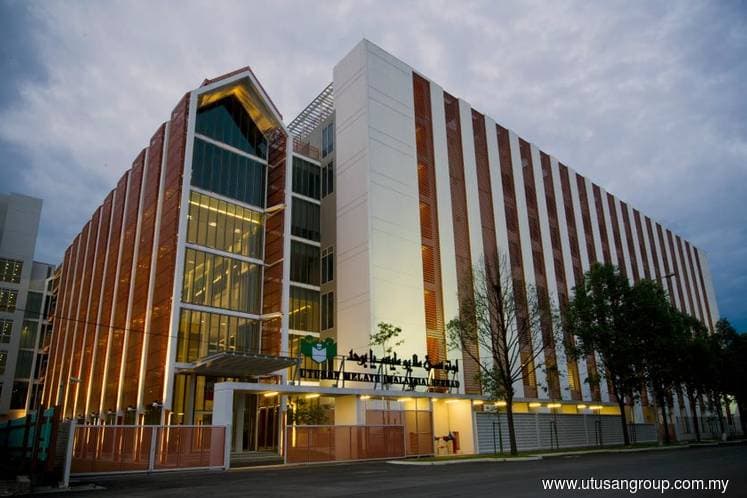
KUALA LUMPUR (Oct 9): Utusan Malaysia, the oldest Malay-language newspaper in the country, will carry on despite the operational shutdown of its former holding company Utusan Melayu (M) Bhd today, says the latter's executive chairman Datuk Abd Aziz Sheikh Fadzir.
"Utusan will live on. We are liquidating the holding company but the ownership of the printing licences [has] been acquired by Aurora Mulia and they will relaunch publications in the near future," Abdul Aziz told theedgemarkets.com.
Aurora Mulia is linked to businessman Tan Sri Syed Mokhtar AlBukhary and has recently surfaced in listed media group Media Prima Bhd, with its shareholding in the latter amounting to 31.22% to-date.
Earlier today, theedgemarkets.com reported that an Utusan Melayu circular to staff had informed employees that the newspaper publisher is ceasing operations today, with their employments ending on Oct 31.
Employees were told to vacate workstations and return access cards by 1pm today while a staff briefing would be held on Oct 30.
When asked whether the reboot of Utusan Malaysia will mean the employment of existing staff will be transferred to a new holding entity, Abdul Aziz said that will be up to the new shareholder.
Recall that on Sunday (Oct 6), Utusan Melayu said that it had sold a 70% interest in its subsidiary Dilof Sdn Bhd to Aurora Mulia for an undisclosed sum. The sale was to ensure the continuity of Utusan Malaysia and the 15-year-old Kosmo!, another Malay daily under its stable.
Dilof is the holding vehicle for the printing licences and archives of Utusan Malaysia and Kosmo!, and the change in ownership of the licences had been approved by the Home Ministry in early October, says Abdul Aziz.
A quick check on the Companies Commission of Malaysia database shows that Dilof was renamed as Media Mulia Sdn Bhd with effect from Monday (Oct 7), a day after the acquisition.
Separately, Human Resources Minister M. Kula Segaran told reporters at the Parliament lobby here today that Utusan Melayu employees facing retrenchment by end-October can apply for coverage under the Employment Insurance System (EIS).
EIS is a financial insurance scheme under the Social Security Organisation (Socso) aimed at helping retrenched workers until they regain employment.
The shutdown of Utusan Melayu's operations is the culmination of several initiatives thus far to turn the company around since May 2018. Among others, in September 2018, Utusan Melayu offered a voluntary separation scheme (VSS) to 800 staff, over half its 1,500-strong workforce at the time.
In 2019, the management also increased Utusan Malaysia's newsstand price by 50 sen to RM2 starting Aug 23, while the price for Kosmo! was also increased by the same quantum to RM1.50 in what Abd Aziz said was a "do-or-die" situation at the time.
On Aug 30, Utusan Melayu shares were delisted from Bursa Malaysia after 25 years of floatation after its board chose not to appeal the delisting.
The company had earlier fallen into Bursa's PN17 status on Aug 20, ten days after defaulting on principal and profit payment totalling RM1.18 million to Maybank Islamic Bhd and Bank Muamalat Malaysia Bhd.
As at June 30, 2019, Utusan Melayu's total unaudited liabilities stood at RM392.32 million, which includes RM139.06 million in short-term borrowings.
In contrast, its assets totalled RM293.15 million, of which RM233.76 million were classified as held for sale. It had RM9.7 million cash as of June 30.
Meantime, Utusan Malaysia’s National Union of Journalists branch blamed the Utusan Melayu closure, which at present leaves 862 people jobless, on UMNO’s meddling and interference for its own political purposes, according to press reports.
It was reported that the newspaper traces its history to 1939, 18 years before Malaya gained independence in 1957, and 24 years before Malaysia was formed in 1963.
“To us, this is the aftermath of political control on a newspaper. The Utusan newspaper operated from last time, not for profit, but mere political interests,” union chairman Mohd Taufek Razak was reported as saying.
It was reported that Taufek was referring to the takeover of Utusan Melayu by UMNO in the early 1960s as the independent editorial stance at the time did not always align with the political party’s interests.
The takeover was resisted by the editorial team initially, culminating in an infamous strike from July 21 till Oct 21, 1961, but in the end the takeover went through.
